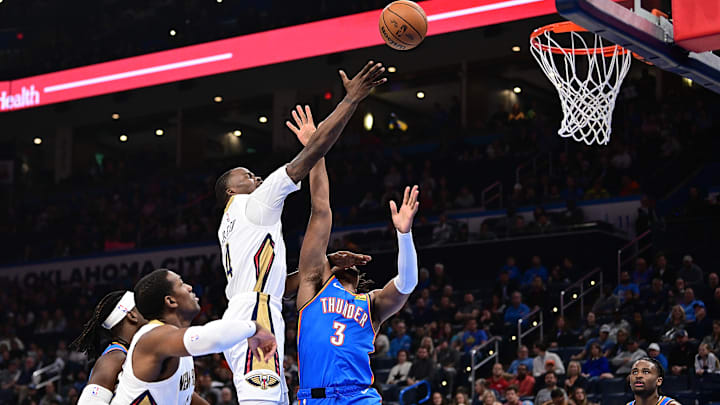It was always guaranteed that the OKC Thunder would find themselves playing through an agonizing adjustment period with Chet Holmgren now sidelined through at least mid-January with an iliac wing fracture in his right hip.
Not only is he one of the ball club's foundational cornerstones, but considering their two other primary bigs Isaiah Hartenstein and Jaylin Williams are also currently out of the lineup due to health-related ailments, it's painfully evident that Oklahoma City's frontcourt lacks size and strength compared to the rest of the west and, frankly, the vast majority of the league.
Though their undefeated 2-0 record since Holmgren's diagnosis should certainly be seen as an encouraging sign for the franchise, unfortunately, from both the eye test and advanced metrics it's more than apparent that this team is now struggling mightily in numerous areas of the game, most notably in the rebounding department.
Before the budding star big's grueling fall to the floor back on November 10 in their matchup against the Golden State Warriors, the Thunder were ranked among the top half of the association in rebounds per game, pulling down an 11-best average of 44.8 a night, with Holmgren, himself, being responsible for 8.7.
During these two games played post-diagnosis, OKC has plummeted in efficiency on the boards as they find themselves grabbing just 30.0 per game, ranking them dead last over this span. Most recently, they found themselves being outrebounded against New Orleans 58 to 31.
This stark shift in effectiveness is undoubtedly alarming. However, during his post-game press conference on Wednesday night, coach Mark Daigneault provided his honest take on how he believes his team has and can continue to make up for this lack of production moving forward.
Mark Daigneault addresses OKC Thunder rebounding woes
"We never go in saying, 'Man we'd love to get out-rebounded by 20 tonight.' We're trying to compete on the glass, but there are natural trade-offs that you have when you play smaller and obviously we're playing smaller right now. We want to be a team that can offset our vulnerabilities with our strengths. I think sometimes you get tempted, from a coaching standpoint, to focus on all the things that are going wrong but something the solution is to do your best stuff better and I thought that's what we did tonight," Daigneault said.
What this "best stuff" that coach Daigneault is referring to was further broken down during his presser, specifying his team's ability to put pressure on an opposing team's offense, being successful in close-out sets, picking up the pace and playing faster than the opposition, and properly spacing out the floor.
Based on the numbers, the Thunder have certainly managed to do virtually all of these things during this small-ball period, as they've seen an uptick in 3-point percentage (rank top-10 at 38.8 percent), are tied for first in steals (16.0), and have forced opponents into committing roughly four more turnovers than they were before Holmgren's injury.
Now, does this strategy serve as a foolproof trade-off for their lackluster efforts on the glass? No, and, eventually, their struggles on this end will come back to bite them.
Nevertheless, through this point in time, their shift in focus on the hardwood has proven successful and, until one of their bigs makes their way back to the lineup, this approach that coach Daigneault pointed out is bound to continue.
Frankly, it's the only choice they have.
